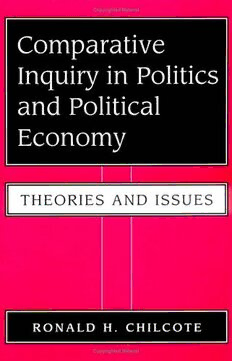
Comparative Inquiry In Politics And Political Economy: Theories And Issues PDF
112 Pages·1999·30.043 MB·English
Most books are stored in the elastic cloud where traffic is expensive. For this reason, we have a limit on daily download.
Preview Comparative Inquiry In Politics And Political Economy: Theories And Issues
Description:
As an introductory text in comparative study, this work begins with the assumption that students should examine a variety of perspectives and explore alternative possibilities as a means of arousing curiosity, stimulating creativity, building interest and self-motivation, and enhancing understanding of complex issues in politics and political economy.The book provides the student with the foundations for comparative inquiry. Its purpose is threefold: to sketch an overview of the major theories and concepts; to expose issues, summarize arguments and counter-arguments; and to encourage the beginning student to pursue critical thinking in the recognition that mainstream ideas deserve scrutiny, many essential questions remain unsettled, and that the outcome may result in the formulation and reinforcement of a personal perspective, premised on one’s individual learning.The principal chapters focus on important themes and dichotomies of theory with attention to institutional frameworks (state and system approaches), the social dimension (class and group formations), the cultural dimension (individual and collective preferences), the economic dimension (capitalist and socialist development), and the political dimension (representative and participatory democracy).
See more
The list of books you might like
Most books are stored in the elastic cloud where traffic is expensive. For this reason, we have a limit on daily download.
